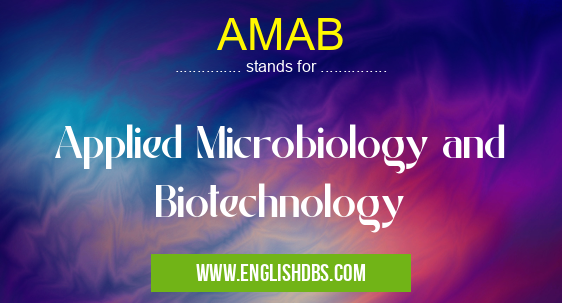What does AMAB mean in BIOTECHNOLOGY
Applied Microbiology and Biotechnology (AMAB) is an interdisciplinary field of study focusing on the application of microbiological and biotechnological disciplines to solve real-world problems. It combines elements from microbiology, biochemistry, genetics, molecular biology, environmental science and engineering. AMAB seeks to research, develop and implement novel technologies to benefit humanity by improving our health, increasing agricultural yields, developing bioenergy sources and preserving natural resources.

AMAB meaning in Biotechnology in Academic & Science
AMAB mostly used in an acronym Biotechnology in Category Academic & Science that means Applied Microbiology and Biotechnology
Shorthand: AMAB,
Full Form: Applied Microbiology and Biotechnology
For more information of "Applied Microbiology and Biotechnology", see the section below.
Focus Area
At its core, AMAB focuses on the research and development of microbial processes for industrial applications such as food production, waste treatment, drug manufacturing, bioremediation, biofuels production and other industrial processes. With advances in modern technology—including nanotechnology—applied microorganisms can now be used more reliably than ever before in industrial processes due to their efficiency and robustness. Additionally, the use of genetically modified organisms allows scientists to create new microbial strains tailored for specific needs.
Benefits
The application of AMAB provides many benefits including cost savings through efficient production processes; improved product quality; reduced environmental pollution; improved health outcomes; increased agricultural productivity; improved energy efficiency; meeting government regulations; preservation of natural resources; minimizing hazardous waste management costs; reducing manual labor requirements in certain processes. Additionally, advances in amab have made it possible for researchers to explore new areas such as medical diagnosis and therapeutic treatments using microbes or related agents at a much larger scale than that which was previously possible.
Essential Questions and Answers on Applied Microbiology and Biotechnology in "SCIENCE»BIOTECH"
What is Applied Microbiology and Biotechnology?
Applied Microbiology and Biotechnology (AMAB) is an interdisciplinary field that combines the principles of microbiology, biochemistry, genetics, engineering, and a wide range of other disciplines to solve problems. It is a diverse area of research involving the design and use of living systems for practical applications such as drug delivery, gene therapy, wastewater treatment, biodegradation of environmental pollutants, and the production of food and biofuels.
What are some examples of AMAB application?
Examples include using microorganisms to clean up contaminated areas like oil spills; producing biofuels from biomass; using genetically modified crops for increased yield; creating antibiotics to fight infectious diseases; using genetically modified yeast to produce specialty chemicals or optimize brewing processes; using probiotics to improve human health; designing biomimetic materials for medical implants; developing vaccines against pathogens in livestock operations; and so much more.
What kind of knowledge is required to pursue AMAB studies?
To understand AMAB effectively requires cross-disciplinary knowledge in topics such as bacteria/microorganism physiology, molecular biology/genetics/recombinant DNA technologies, enzymology/biochemistry, microbial cell culture techniques/metabolism engineering, immunology/vaccines development, nanobiotechnology/drug delivery systems design/biosensors construction, fermentation technology among other related fields.
Who would benefit from studying AMAB?
Anyone with an interest in applied sciences could benefit from studying AMAB as it provides the opportunity to apply existing scientific principles towards solving practical real-world problems. Individuals who are curious about how biological organisms can be used for engineering solutions would find this field especially stimulating.
Are there professional opportunities within the field of AMAB?
Absolutely! There are numerous career paths available within AMAB such as researchers in universities or government agencies that focus on developing new applications or improving current ones. Professionals such as engineers may also specialize in designing specialized equipment for laboratory research in addition to working on large scale projects outside the lab environment. Other career paths include product development managers or business analysts within pharmaceuticals companies that need insight into new therapeutic treatments or economic development projects utilizing microbial applications.
Are there any safety considerations with AMAB research?
As with all science experiments safety should always be taken seriously when working with any type of biological organism. This means following proper protocols for handling hazardous substances like chemical reagents or infective agents according to safety guidelines set by occupational health organizations or local regulation authorities before conducting any experimentation process involving living organisms where appropriate protective clothing must be worn at all times.
How does one stay informed about developments in AMAB research?
One can stay informed by reading relevant scholarly journals regularly which will provide meaningful news about the latest developments in Applied Microbiology & Biotechnology research initiatives worldwide. These journals often have relevant articles outlining current breakthroughs in this field along with reviews summarizing the latest advancements made over time providing valuable insights into potential future advances.
Does professional certification exist in this field?
Yes there certain certifications offered by professional bodies which acknowledges individuals who have achieved expertise within an area through training programmes or academic qualifications allowing them access to more diverse opportunities both professionally & academically.
Are there volunteer opportunities available related to AMAB research?
Yes many universities offer volunteer positions such as lab technician roles under graduate students or post doctorates involved with Applied Microbiology & Biotechnology research programs worldwide giving people a unique opportunity to gain experience in this growing industry.
Is it possible to pursue further education after completing initial studies related to Applied Microbiology & Biotechnology?
Potential students may choose to pursue higher degrees such as a Masters degree program focusing on specific areas related inside this discipline including but not limited too Genomics & Proteomics Analysis Techniques which require extensive knowledge base & familiarity with cutting edge technologies used together with biostatistical analysis methods.
Final Words:
In conclusion, Applied Microbiology and Biotechnology (AMAB) is an interdisciplinary field that offers numerous advantages when applied in various industries. From medical diagnostics to waste treatment solutions to process optimization in agriculture or industry—AMAB has proven useful in many aspects of everyday life. As technology advancements continue forward in this area we can expect even more benefits from utilizing the potential offered by microscopic living organisms.
